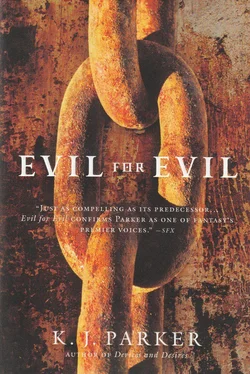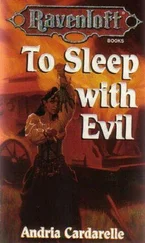K Parker - Evil for Evil
Здесь есть возможность читать онлайн «K Parker - Evil for Evil» весь текст электронной книги совершенно бесплатно (целиком полную версию без сокращений). В некоторых случаях можно слушать аудио, скачать через торрент в формате fb2 и присутствует краткое содержание. Жанр: Фэнтези, на английском языке. Описание произведения, (предисловие) а так же отзывы посетителей доступны на портале библиотеки ЛибКат.
- Название:Evil for Evil
- Автор:
- Жанр:
- Год:неизвестен
- ISBN:нет данных
- Рейтинг книги:4 / 5. Голосов: 1
-
Избранное:Добавить в избранное
- Отзывы:
-
Ваша оценка:
- 80
- 1
- 2
- 3
- 4
- 5
Evil for Evil: краткое содержание, описание и аннотация
Предлагаем к чтению аннотацию, описание, краткое содержание или предисловие (зависит от того, что написал сам автор книги «Evil for Evil»). Если вы не нашли необходимую информацию о книге — напишите в комментариях, мы постараемся отыскать её.
Evil for Evil — читать онлайн бесплатно полную книгу (весь текст) целиком
Ниже представлен текст книги, разбитый по страницам. Система сохранения места последней прочитанной страницы, позволяет с удобством читать онлайн бесплатно книгу «Evil for Evil», без необходимости каждый раз заново искать на чём Вы остановились. Поставьте закладку, и сможете в любой момент перейти на страницу, на которой закончили чтение.
Интервал:
Закладка:
Anser, reporting on the Eremian resistance. He frowned as he broke the seal. He'd sent Anser out of guilt, mostly. The purpose of the mission was to infiltrate the resistance and report back on its activities, but while he was there he'd undoubtedly be making himself useful, if only to help pass the time, and when it came to violence, Anser could be very useful indeed. Anser to Duke Valens, greetings.
Things aren't going well, but they could be worse. Yesterday we attacked the supply convoy for the main expeditionary force. We did a good job. It was the fifth convoy in a row that we stopped from getting through, which by my calculations means that fairly soon they'll have to turn around and go back to the city or starve. Unfortunately, we got beaten up pretty badly in the process; over a hundred killed, half as many driven off and scattered, quite possibly caught by the cavalry patrols. The Mezentines have hired some new light cavalry; I haven't a clue who they are or where they're from, but they're obviously used to operating in the mountains, and they're proving to be a real nuisance. The bad news is, Miel Ducas is missing. If he was dead and they'd found the body, I think we'd have heard about it by now, it'd be the break the Mezentines have been waiting for. We've been trying to keep the fact that he's missing quiet, but it won't be long before it gets out. When that happens, it'll probably be the end of effective resistance. It's annoying, because we were holding our own, if not making any real progress. Meanwhile, I'm not sure who's in charge here, though I have an unpleasant feeling it's probably me.
This is only a suggestion; but I understand you've got another Ducas there with you in the city, Jarac or Jarnac or some such. If it turns out we really have lost Miel, would you consider sending him here? The Ducas name means a lot to these people, and I guess your specimen's now the head of the family.
Things we need: food, of course, and boots and blankets; a few barrels of arrows would be nice, but I imagine you'd rather keep them for yourself. A good surveyor would have made a hell of a difference a week ago. If you can spare a couple of field surgeons, we could probably find something for them to do.
According to some people who came in last week, the Mezentine seventh infantry have left the city, headed north. If it's true I can't account for it. I don't trust the people who told me this, but I have no reason to believe they're lying.
Trust again. As Orsea had said, that old thing. Valens reached across the table for the ink bottle and wrote a requisition for food, boots, blankets; he hesitated, then added ten barrels of arrows and two surgeons. Wasteful, because if Miel Ducas really was dead, quite soon there'd be no resistance to feed or arm, Anser was quite right about that. Even so; he sealed the requisition and put it on the pile for the clerks to collect. He wondered if he ought to have Anser's letter copied to Orsea, but decided against it.
He picked up another sheet of paper, and wrote on it: Valens to Anser, greetings.
Make finding out about the Ducas your first priority. I can't send you Jarnac Ducas, he's too useful to me here; at last I've found an Eremian who's good for something other than causing me problems. I'm sending you what you asked for, but there won't be any more. I think it's time to cut our losses, even if the Ducas is still alive. Once you've found out about that, disentangle yourself and come home; we've had a change of plans here, and I need you to do something for me. I'm sorry for wasting your time…
Valens hesitated, then picked up the pumice and rubbed out the last line. He wrote instead:
I hope you've enjoyed your holiday (I know how much you like travel and meeting new people). One last thing; if any of your people there have heard any rumors-anything at all-about who sold out Civitas Eremiae to the Mezentines, I want to know about it. Until I know the answer to that question, I'm wasting my time here trying to plan any kind of strategy.
He lifted his head and looked out of the window. It had stopped raining. Too late now, of course. As far as he was concerned, the day was a dead loss.
Well, he was in the library, he might as well read a book. There were plenty to choose from. His father (his father used to say that reading was like taking a bath; sometimes you had to do it) had bought a hundredweight of books (various) from a trader. He had had the books unpacked, and shelves put up in the old game larder to store them on. When Valens was fifteen, he'd told him he could choose five books for his own; the rest would be burned. Valens had read them all, desperately, in a hurry, and made his choice. Varro's On Statecraft, Yonec's Art of War, the Suda Encyclopedia, Statianus on revenues and currency, and the Standard Digest of Laws five books, Valens reckoned, that between them contained the bare minimum of knowledge and wisdom a prince needed in order to do his job properly. When he announced that he'd made his choice, his father had had the five books burned and spared the rest; books should be a man's servant, he declared, not his master. Valens wasn't quite sure he saw the point, but he'd learned the lesson, though not perhaps the one his father had intended to convey: that to value anything is to give it an unacceptable degree of power over you, and to choose a thing is to lose it.
Most of what survived the bonfire was garbage: inaccurate books with pretty pictures, elegant and insipid belles-lettres, genteel pornography. When his father died, Valens sold most of them back to the same trader and started building a real library. There were three sections: technical and reference, literature, and the finest collection of hunting manuals in the world.
He stood up, faced the shelves like a general addressing his troops on the eve of battle, and made a choice.
Regentius' Calendar of Hawks and Ladies had been one of the original hundredweight. It was a big, fat book with lurid pictures of birds of prey and couples having sex, apparently drawn by a scribe who'd never seen either, but there was one chapter that justified keeping it. The woman is a heron who feeds alone on the marshes; the man is the wild falcon who hunts her and is himself hunted by the austringers, who wish to break him and sell him to the king. To catch the hawk, the austringers first snare the heron with lime and stake her out under a cage-trap. The falcon knows something is wrong, because no heron ever stood still for so long under a tree; but although he knows it's a trap, he can't deny his nature and eventually he swoops to the kill and triggers the snare; the cage drops down around him and he is caught. An allegory, the sort of thing that was considered the height of sophistication two hundred years ago; just in case the reader fails to make the obvious interpretation, there are brightly colored vignettes of men and women in the margin to point him in the right direction.
The point being: the falcon cannot deny its nature, even though it can see the cage hanging from the branches on a rope. The poet is too busy with his stylish double entendres to develop the theme properly, but it's there nevertheless, like a large rock in the middle of a road.
Valens read it (he knew it by heart already), and found that he'd picked up a sheet of paper and his pen without knowing it. He frowned, then began to write. Suppose that, as the cage fell, it broke the falcon's wing. It'd be worthless then, and if the austringers were humane men, they'd break its neck. The heron is of value because it can be eaten, but a dead falcon is just bones and feathers. The hunters want to catch it so that it can hunt; it needs to hunt (and therefore destroys itself in their trap, and becomes worthless) because that is its nature. Since the heron is the only element in the story that is valuable in itself, wouldn't it have been more sensible to catch and eat the heron and leave the falcon in peace?
Читать дальшеИнтервал:
Закладка:
Похожие книги на «Evil for Evil»
Представляем Вашему вниманию похожие книги на «Evil for Evil» списком для выбора. Мы отобрали схожую по названию и смыслу литературу в надежде предоставить читателям больше вариантов отыскать новые, интересные, ещё непрочитанные произведения.
Обсуждение, отзывы о книге «Evil for Evil» и просто собственные мнения читателей. Оставьте ваши комментарии, напишите, что Вы думаете о произведении, его смысле или главных героях. Укажите что конкретно понравилось, а что нет, и почему Вы так считаете.












